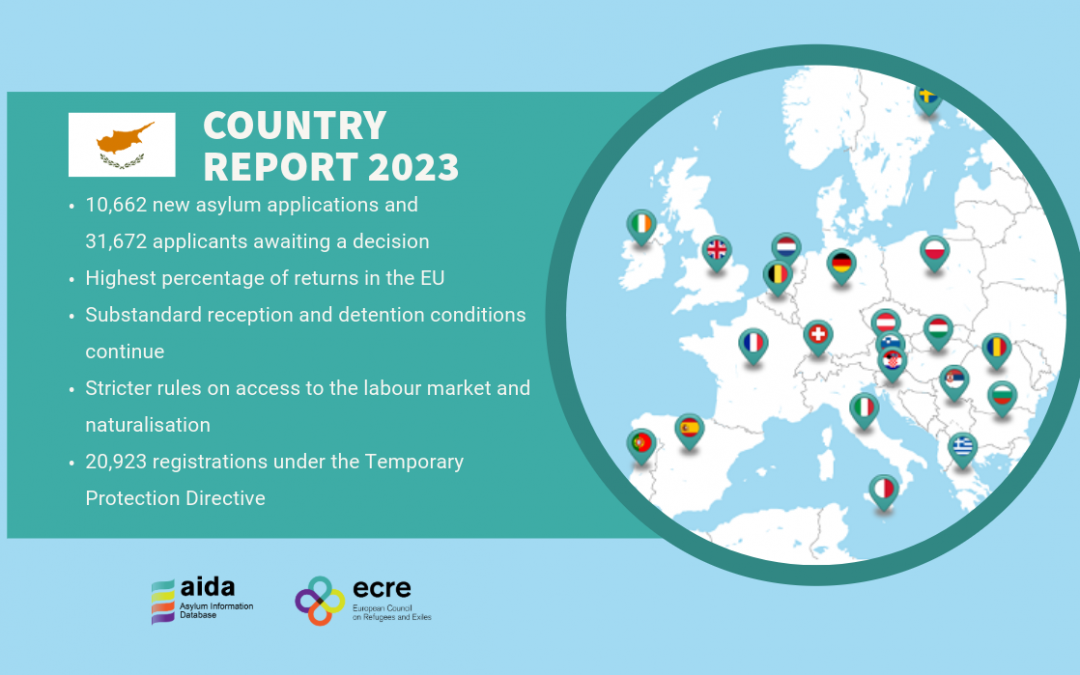The updated AIDA Country Report on Cyprus provides a detailed overview of legislative and practice-related developments in asylum procedures, reception conditions, detention of asylum seekers and content of international protection in 2023. It also includes an annex which provides an overview of temporary protection (TP).
In 2023, a total of 10,662 new asylum applications were submitted in Cyprus, half the number submitted in 2022. The most represented country of origin was Syria (6,199 applications) followed by Nigeria (1,019), Afghanistan (736), the Democratic Republic of Congo (DRC) (427) and Cameroon (421). Whereas the overall protection rate remained high for Syrians (subsidiary protection granted in 97.8% of cases) and Afghans (refugee status granted in 79.3% of cases), there was a high rejection rate for applicants from the three other countries: Nigeria: 98.4%, DRC: 95.2% Cameroon: 89.9%. Although 18,321 decisions were issued in 2023, the backlog of pending decisions remained extremely high, with 26,599 people awaiting a decision at first instance by the Asylum Service and 5,073 at second instance by the International Protection Administrative Court at the end of the year.
In 2023, Cyprus ranked first among EU member states (MS) for the highest percentage of returns and fourth in terms of absolute numbers of returns and deportations of irregular migrants. By the end of 2023, 9,193 people had left Cyprus, compared to approximately 5,800 in 2022. In April 2024, amidst an increase in arrivals of Syrians, the government announced that it was suspending the examination of their applications.
Regarding Dublin transfers, in 2023, 1,709 people were transferred from Cyprus to other EU MS, most notably Germany (636), and 18 were returned from other EU MS to the country. In 2023, 1,773 persons were relocated, mainly to Germany and France, under the Voluntary Relocation Programme, which was agreed in June 2022 to support the MED5 countries to manage increased arrivals of asylum seekers. It should be noted that, in view of the increase in the arrivals of Syrians, the government decided to exclude them from the Programme as a deterrence measure.
As of 28 February 2023, 15,338 individuals were registered as TP beneficiaries, compared to 13,893 on 31 December 2022. As of 31 December 2023, 20,923 individuals have been registered as beneficiaries under the Temporary Protection Directive, making Cyprus one of the highest per capita receivers of Ukrainian refugees.
Despite a noted improvement in conditions in reception centres, reception standards remained below adequate levels in 2023 as the majority of asylum seekers were hosted in the community and were often living in extremely dire conditions. Of particular concern was the situation of unaccompanied children who remained without adequate guardianship and at high risk of trafficking as well as sexual and labour exploitation. In 2023, Cyprus also saw a significant surge in violence against migrants, including pogrom-like demonstrations and violent attacks against racialised people. In addition, asylum seekers’ access to the labour market was also severely hindered as the law was amended to prevent their access to the labour market until nine months after submitting their asylum applications, rather than after just one month as was the case under the previous legislation, which had been in force since 2018.
Whereas the number of detained asylum seekers remained low in 2023, alternatives to detention were not systematically applied, including for vulnerable people. Asylum seekers continued to be detained in police holding cells in sub-standard conditions, with significant obstacles to accessing the asylum procedure and legal remedies both against their detention and the rejection of their asylum applications.
Integration into Cypriot society remained out of reach for the majority of beneficiaries of protection in the country. Most notably, the law was amended in 2023 to severely restrict their access to naturalisation, including by increasing the required time of residency in Cyprus from five to eight years, and excluding the years spent as asylum applicants and beneficiaries of subsidiary protection or TP. In addition, irregular entry into the territory would be considered an indication of an applicant not being of “good character” and benefiting from financial assistance during the asylum procedure and thereafter would be considered as an indication of a lack of financial resources in the assessment of an application for naturalisation. Similarly, as well as remaining very lengthy, family reunification procedures also excluded beneficiaries of subsidiary protection (i.e. 97.8% of Syrians present in the country).
The full report is available here and the annex on temporary protection is available here.
For more information about the AIDA database or to read other AIDA reports, please visit the AIDA website.

